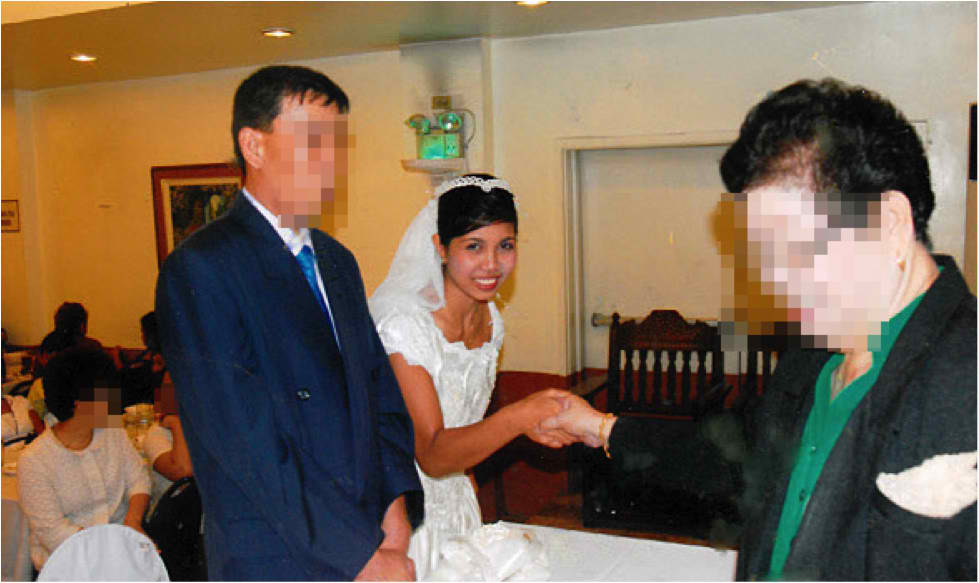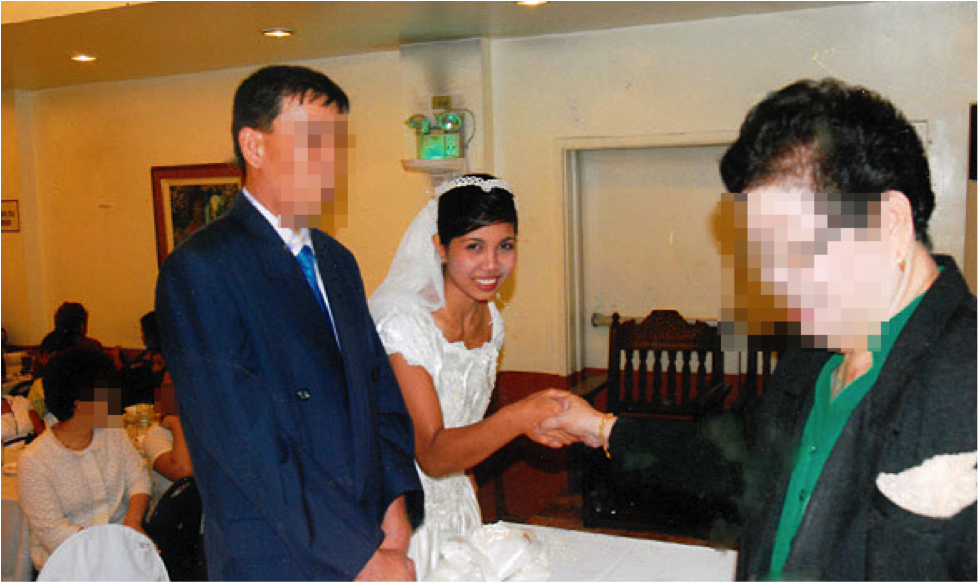(Conclusion)
WOMEN’S rights and migrant advocates in South Korea say complaints of domestic abuse are not uncommon here, and the story of Cathy Deocades is no exception.
Cathy’s story started out as a hopeful search for a better life in South Korea, whose cultural exports like K-Pop-music and Korean dramas often paint a picture of domestic harmony. Cathy met her husband, who turned to the Philippines in search for a woman he could not find in South Korea, through a marriage broker. Shortly after the two met for the first time they got married. The couple did not have time to get to know each other.
In South Korea, domestic abuse in multiethnic families is not unusual. But the incidence has gone down in recent years, says policewoman Kim Gyu-ree who works in the foreign affairs division in Cheonan, a city with a higher than average migrant population.
Cathy’s case, however, is the only one that ended in death among the estimated 8,000 Filipinas married to Koreans, said Sylvia M. Marasigan, consul general of the Philippine Embassy in Seoul. If there had been a suicide before Cathy, it was not reported to the embassy.
On Jan. 11, 2011, Cathy was found hanging from a wooden bar in an abandoned house near her home in the rural village of Tapgok-ri, Yugu-eup in Gongju-city, 150 kilometers from Seoul. The police concluded suicide and saw no need for an autopsy. But Cathy’s parents and siblings suspect foul play, and had her autopsied by a Philippine doctor, whose findings raised the possibility of homicide. The conflicting findings have muddled the circumstances of her death.
Suspicions of foul play were fueled by reports that Cathy was an abused wife. Cathy experienced domestic abuse, said her parents. Her sister went even a step further and alleged that Cathy’s husband sold her to other men. She was abused by the mother-in-law also, at least verbally, they said.
When personnel of the Philippine Embassy visited Cathy at her home in Gongju in the fall of 2010 and questioned her about the problems and hardships they heard she was facing, Cathy refused to confirm them.
In fact, Cathy and her husband, Park Heung-yong, were seen holding hands back then. Cathy admitted there were problems in the marriage, but there was nothing she could not handle herself, said Marasigan.
In the morning of Jan. 11, 2011, Cathy went missing and her father-in-law, Park Yeong-shin, could not find her, he says. “She was not around the house,” Park said in an interview at his home in January 2012.
Park said he kept on searching, walked through the snow, up the mountain where Cathy had gone every once in a while during the last months. He was alone. His son, Cathy’s husband, a truck driver, was at work and Cathy’s mother-in-law had gone to a neighboring village.
At around 11 a.m. he found her, hanging from the wooden bar in the abandoned house. The spot where Cathy hung was overlooking the whole village, the farmhouses and the cattle in the cowshed at the foot of the hill.
Cathy had supposedly used the string of a hoodie sweater to hang herself.
If Cathy did kill herself, she would be one of thousands who do so every year in South Korea.
This East Asian nation of 50 million people has the highest suicide rate among 34 developed countries. In South Korea, suicide is the most common cause of death for people between the ages of 10 and 40. A suicide of a woman in her mid-20s would not be totally unusual.
But unlike in the United States or Germany for example, autopsies of suicide cases in South Korea are not mandatory. Relatives may ask for one, or if there is reasonable doubt about the death of a person, an autopsy is usually suggested by the police and ordered by the prosecutor.
“Cathy’s family in Korea did not want an autopsy,” said Chang Sun-ik of the scientific investigation team of Gongju Police during a phone interview. “And as there was no doubt about the suicide, we did not order one.”
In the village of Gongju people talk about Cathy as the crazy one. A Korean neighbor remembers Cathy coming over at night, opening the heater door and burning herself.
It is said she was seen outside on the street, barefoot at night, sometimes naked. Cathy was reportedly taken to a mental hospital in the fall of 2010. But doctors could not find any abnormality.
Cathy, everyone presumed, suffered from postpartum depression after giving birth to a boy.
Her in-laws said she began developing weird behavior during the ninth month of her pregnancy. She started hanging out at the mountains, her mother-in-law said. And she slept in the little church of the small village during nighttime.
“I asked her what the problem was,” said Park Yeong-shin, her father-in-law.
But even expressing herself to the in-laws was difficult for Cathy. She could not speak Korean very much. The only Filipino woman in the village beside Cathy had left to live near the city of Cheonan in October 2010. Cathy was all alone, with no one to talk to.
“We called a Korean teacher to enable her to speak with us,” said her father-in-law. “She answered that there is no problem. She said she just wanted to die.”
Cathy’s in-laws said when she began acting extremely weird and confused, even wanting to give coffee to her baby, they decided it was best for her to visit the Philippines. “We prepared for a trip to the Philippines. We thought she might get better at her home,” they said.
Cathy and her husband were supposed to go together, but Cathy cancelled the trip suddenly, they said.
Cathy’s brother in the Philippines, who knew about the planned trip, told a different version: “The mother in-law was against it.”
“Cathy was a normal person, but she became mentally ill during her first year in Korea,” said Kim-Seong Mi-kyeong, director of Incheon Women’s Hotline which investigated the case. But people close to Cathy refused to provide details about what had happened in the village. The only testimonies they got were those of Cathy’s Korean family and their neighbors.
“Filipino friends of Cathy refused to talk about the case,” said Kim-Seong Mi-kyeong. A former Filipino neighbor said to be a friend of Cathy denied they were friends, and would only provide information through a friend of her husband. Cathy was acting weird, the friend would only say.
Cathy’s story is too much for Filipino women in South Korea.
“I came home at night and the sister of a friend of mine who stayed at my house during that time told me Cathy died,” said Jolly Regacho, a Filipina who has lived in South Korea since she was 18.
Regacho is married to a Korean she met almost two decades ago in the Philippines. Her husband is living in Angeles, Pampanga permanently. But Regacho is living in her husband’s country working for a local Filipino founded organization taking care of migrants who have difficulties adjusting to life in South Korea. Every day she deals with domestically abused Filipino migrants.
When Regacho learned Cathy’s Korean husband wanted her remains cremated, she objected. “The first thing I was thinking was there is something wrong with that case,” she said. She made a few phone calls and eventually talked to Cathy’s parents in the Philippines.
The Philippine Embassy in South Korea intervened. “We do not usually cremate dead Filipinos here in South Korea,” said Marasigan.
When Cathy’s family in General Santos City requested that Cathy’s body be brought home, the cremation in South Korea was stopped. “It was her (Korean) husband who paid for the transportation of the body back to the Philippines,” Marasigan said.
On Jan. 19, 2011, Cathy finally returned home—in a box.
The author is a German journalist based in Seoul and is a student at the Ateneo de Manila University’s M.A. Journalism Program. He submitted a version of this story for his Investigative Reporting class under VERA Files trustee Luz Rimban.

